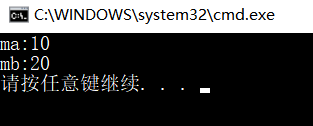常对象只能调用常方法
#include<iostream>
using namespace std;
class Test
{
public:
Test(int a, int b):mb(b)
{
ma = a;
//mb = b;
}
void Show()
{
cout << "ma:" << ma << endl;
cout << "mb:" << mb << endl;
}
private:
int ma;
const int mb;
};
int main()
{
const Test test1(10,20);//常对象
test1.Show();
return 0;
}

分析:

第一个const修饰的 test1 *this有间接修改的风险,所以编译器防止发生,直接杜绝掉。
修改:
void Show()const
{
cout << "ma:" << ma << endl;
cout << "mb:" << mb << endl;
}
void Show()const 加const 此时Show是一个常方法
常方法:this类型: const Test* const
相当于 const Test* const this=&test1;
此时 *this被const修饰,没有被间接修改的风险,编译器允许通过。

常方法不能调用普通方法
void Show()const//常方法
{
cout << "ma:" << ma << endl;
cout << "mb:" << mb << endl;
/**错误**/
//Show(ma);
//this->Show(ma); // 常方法this指针类型 const Test* const
(*this).Show(ma);//左边是常对象,常对象不能调用普通方法
}
void Show(int a)
{
cout << "ma:" << ma << endl;
cout << "mb:" << mb << endl;
} //Show(ma);
//this->Show(ma); // 常方法this指针类型 const Test* const
(*this).Show(ma); //左边是常对象,常对象不能调用普通方法
常方法里面的this指针指向的是常对象,常对象不能调用普通方法。
普通对象可以调用常方法
int main()
{
Test test2(10,20);
test2.Show();//普通对象可以调用常方法
return 0;
}
Test test2(10,20);//普通对象
test2.Show();
这里相当于:const Test* const this=&test2;
普通方法可以调用常方法
void Show()const//常方法
{
cout << "ma:" << ma << endl;
cout << "mb:" << mb << endl;
}
void Show(int a)
{
cout << "ma:" << ma << endl;
cout << "mb:" << mb << endl;
(*this).Show();
}普通方法里的this指针指向的是普通对象 ,普通对象可以调用常方法。
